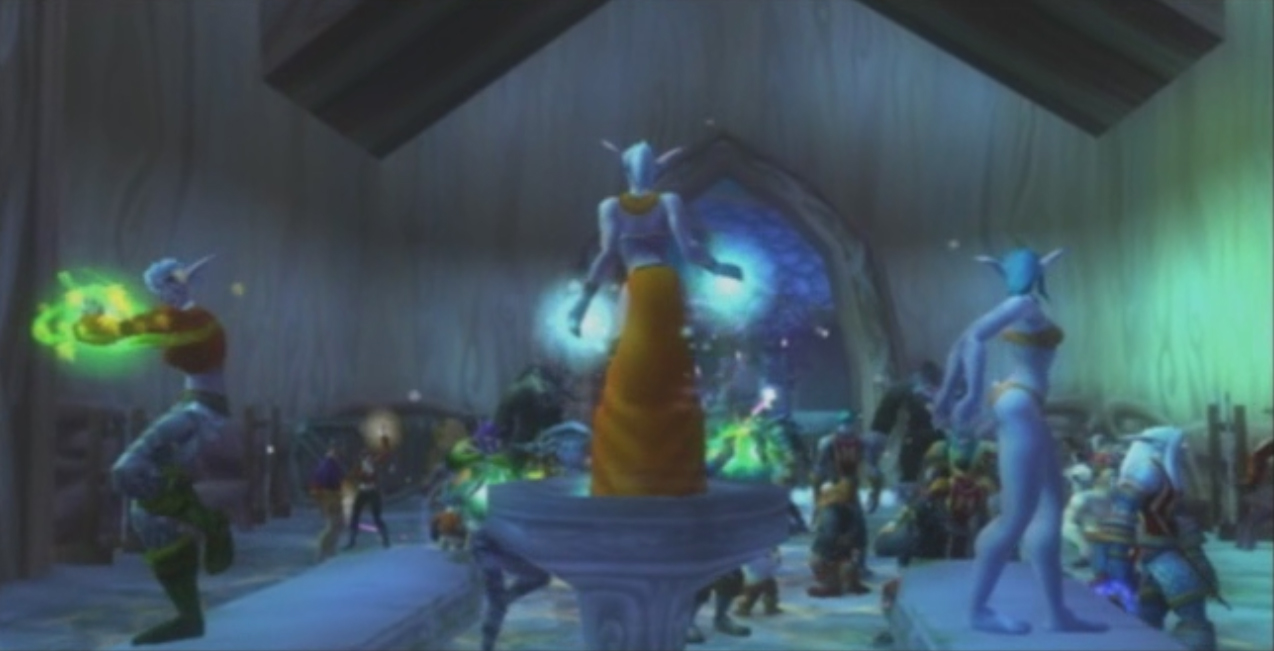    |

Tristan Pope, "Not Just Another Love Story"
|
| STS 144
Game Studies: Issues in Design, Technology and Player Creativity
Spring 2009 |
| Instructor: Henry Lowood |
Office:
M10-11; W 2.30-4, Green Library 321C |
|
Tuesday, 2.15-5pm |
ROOM: Encina West 101 |
|
On this page you will find:
(1) this week's assignment.
(2) the final paper assignment.
(3) the formula for the final grade in the class.
| 2 June |
Presentations -- The other half of the class will present a more detailed version of their arguments, followed by questions. This is your chance to test your ideas with the group and solicit feedback.
For this presentation, use powerpoint or just make an outline and talk. Limit of 15 minutes, including questions.
Turn in rough drafts of your papers before class via coursework.
|
Final paper assignment.
The final paper can be on any topic related to the course themes. I encourage you not to start with the goal of touching every theme, but instead trying to work with one theme in-depth. However, given the course topic, I am duty-bound to be open to creative remixes, right? So feel free to be creative.
Please clear your topic with me by the May 12th meeting of the seminar. Be prepared to present a paper proposal in quickfire fashion on May 19th, for mutual critique and suggestions for improvement, research sources, etc. On May 26th and June 2d, you will present your rough drafts in seminar and get critical feedback from the class. Turn in an outline on May 26th and a rough first draft on June 2d. There will be assignments in coursework for you to drop off the outline and rough draft. The goal is for you all to work in towards the final paper over the last 3-4 weeks of the quarter. Bottom line: No last-minute papers, no all-nighters!
Papers are due June 9!!! Senior grades are due June 12@noon, so please respect this deadline. Please submit via coursework.
In terms of requirements, I expect a minimum length for the final paper in the area of 3000 words, exclusive of bibliography or footnotes. Some of you will be inspired to write at greater length. As long as the length of the paper is justified by the content, this is fine with me, so use as many words as you need.
Padding, however, will certainly be noticed and not be beneficial for your grade. The quality of your writing is important, so write clearly and cogently.
It is required that you provide a bibliography of print and electronic materials and cite them appropriately. Include URLs and titles for websites. Note any interviews or other sources. In other words, be sure to treat this as a research paper.
FYI, here is some guidance on "Using Primary Sources on the Web": http://www.lib.washington.edu/subject/History/RUSA/.
Note: Without getting into a big discussion, I would discourage you generally from using Wikipedia or any other encyclopedia articles without authorship attribution; however, Wikipedia serves a purpose by addressing many neglected topics in areas such as cutting-edge technology or popular culture (i.e., videogames) and, in particular, often provides good guidance to sources for further investigation of these topics. Also, you may find wikipedia -- or any websites for that matter -- useful as primary sources or as a source of data such as publication dates or the like. When in doubt, look for corroborating sources.
A few hints for the paper:
1. Identify your topic clearly in the introduction. Briefly sketch your topic and inform the reader how you intend to organize your presentation.
2. Why is this topic significant? How is it related to readings, discussions or class sessions in this course. Paraphrasing the character Neal (Steve Martin) in the film Planes, Trains and Automobiles: "Here's a good idea - have a POINT. It makes it SO much more interesting for the reader!"
3. The conclusion should reiterate the significance of your topic. It also provides an opportunity to speculate a little; how might what you learned lead to further work, a revision of previous research by others, a new theoretical take, or whatever you have in mind. It is acceptable to suggest some ideas in the conclusion that you do not have time to develop further, but it is not required.
IMPORTANT: Please be aware of the Stanford Honor Code .
Finally, if you are really stuck for a topic, an easy starting-point might be an application of readings or ideas brought out in the first four weeks of the class to case studies like the ones discussed during weeks 5-7. Start with an idea like that, then see where it might lead you.
Did I mention? Papers are due June 9!!! Senior grades are due June 12@noon, so please respect this deadline. Please submit via coursework.
Final grade.
The success or failure of this seminar depends almost entirely on every one of us attending regularly, keeping up with weekly assignments, and contributing to in-class discussion. Your final paper (described above) is a chance to take what you have learned in seminar and apply it to a personal project. The final grade is a mix therefore of two elements:
* participation (1/3), made up of presence, participation, and engagement with the week-to-week readings and topics.
* final paper (2/3), made of outline, draft, and final paper (there will be small penalties if you fail to turn in an outline or draft).
I will track attendance at the weekly meetings. Missing more than one meeting over the course of the quarter will degrade your participation, both figuratively and literally.
